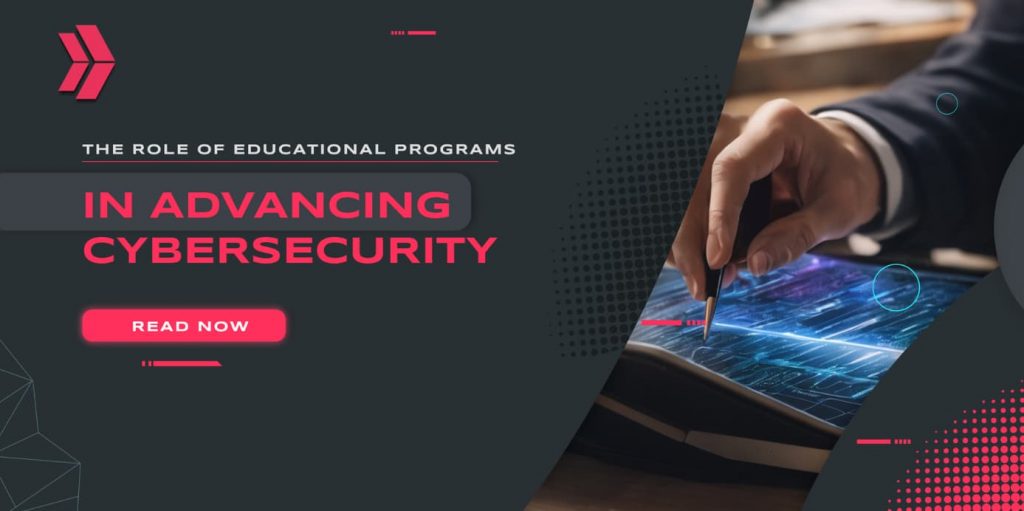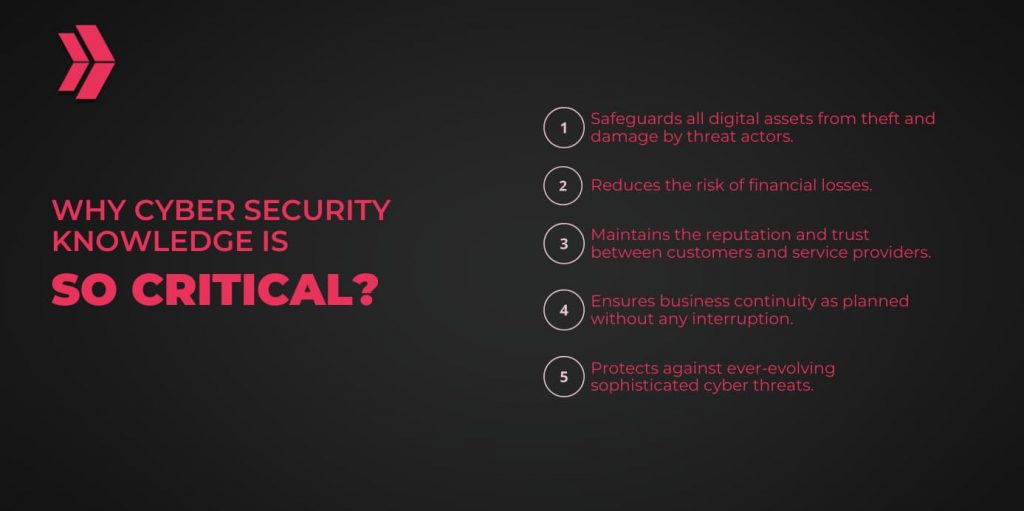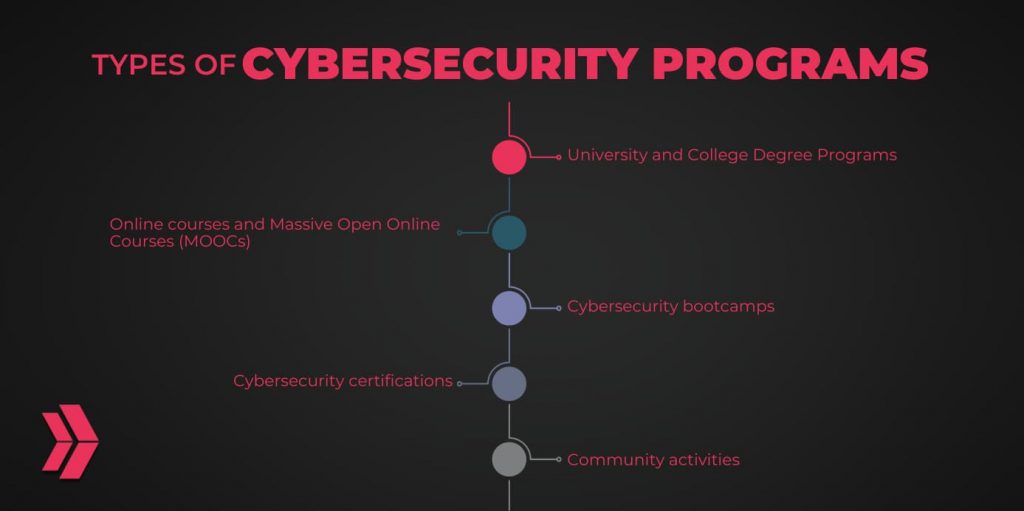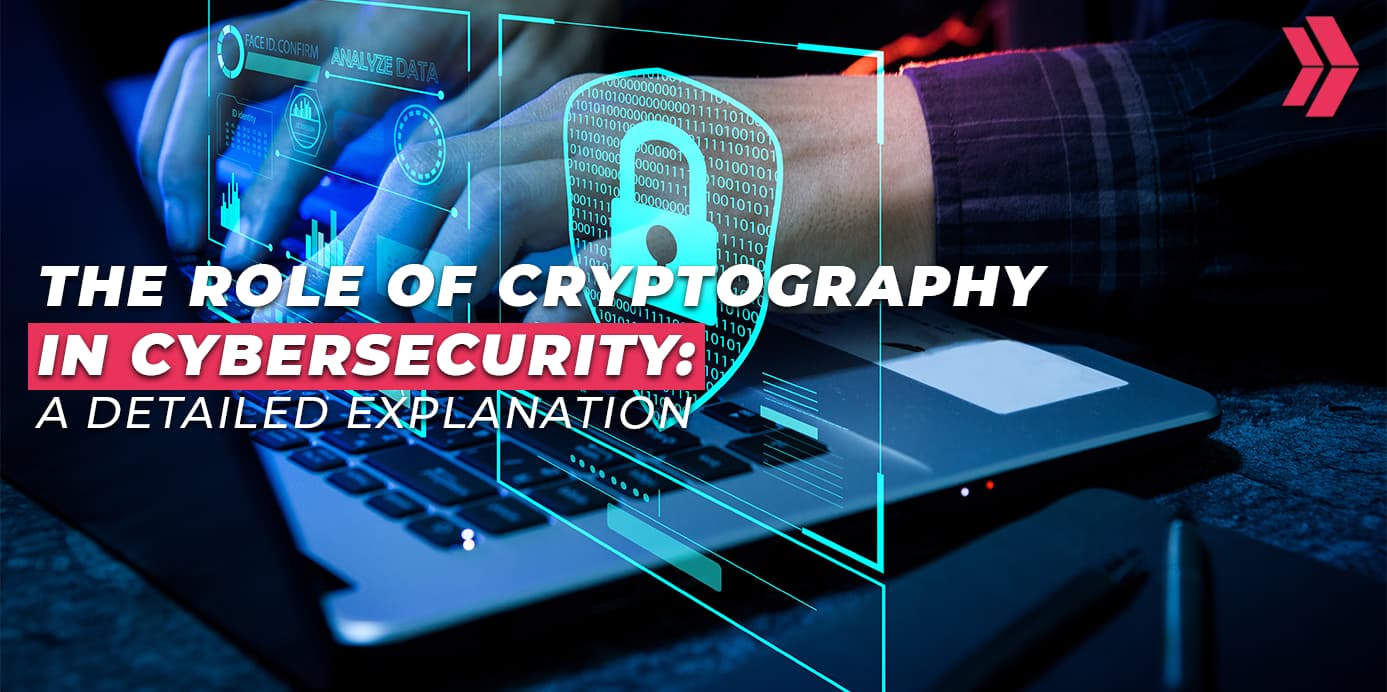The significance of cybersecurity in daily life is escalating at an unprecedented pace. With the ever-growing number of cyber threats, the need for cybersecurity professionals is also surging. In this context, educational programs play a pivotal role in advancing cybersecurity knowledge by providing structured avenues for individuals to learn, understand, and prepare for the intricate landscape of cybersecurity.
Learning cybersecurity requires a multifaceted approach, with various options such as cybersecurity degree programs, online cybersecurity courses, and bootcamps covering different aspects of the field.
Pursuing recognized cybersecurity certifications further validates and enhances expertise, contributing to developing a skilled workforce. Community activities encourage collaboration, promote skill development, and raise awareness to safeguard digital environments effectively.
By taking advantage of educational cybersecurity training, aspiring professionals can build a strong foundation in cybersecurity in the constantly evolving cyber threat landscape. Educational programs offer a complete understanding of theoretical concepts and practical techniques to identify and prevent cyber threats.

Why is Cybersecurity Knowledge So Critical in Today’s Digital World?
Understanding cybersecurity’s importance is critical to our digital world today, and ignoring it can lead to far-reaching unintended consequences. Cybersecurity knowledge is indispensable for 5 main reasons: firstly, it safeguards all digital assets from theft and damage by threat actors. Secondly, cybersecurity reduces the risk of financial losses. Thirdly, it maintains the reputation and trust between customers and service providers. Fourthly, cybersecurity education ensures business continuity as planned without any interruption. Lastly, having cybersecurity knowledge is the best way to counter ever-evolving sophisticated cyber threats.
In this regard, a comprehensive understanding of cybersecurity is indispensable for organizations’ smooth functioning and protection of sensitive information.

How does the Lack of Cybersecurity Knowledge Impact Individuals and Organizations?
A lack of knowledge in cybersecurity can result in the unnecessary consumption of resources, time, and labor. Furthermore, it may lead to substantial financial losses and employment setbacks. Therefore, individuals and organizations must prioritize cybersecurity education and training to protect against cyber threats caused by a lack of cybersecurity knowledge.
Cybersecurity is paramount to protect individuals and businesses from the ever-increasing cyber threats. Therefore, prioritizing cybersecurity measures is essential, as neglecting them exposes entities to unintended consequences, potentially leading to significant harm.
What are the Real-world Consequences of Cyber Threats and Attacks?
Cyber attacks have devastating consequences on businesses and individuals in a wide range of attack types. Any data breach could lead to financial loss and reputation damage, resulting in legal consequences, penalties, and fines.
For instance, the 2018 Marriott breach was a significant disclosure of personal information, which exposed the personal data of up to 500 million individuals, as articulated by the US Federal Trade Commission. Similarly, CNA Financial, a prominent US insurance company, allegedly paid US$ 40 million to hackers following a ransomware attack in 2021, which is believed to be the largest ransomware payout, as per Business Insider.
What Motivates the Need for Cybersecurity Education?
The rise of cyber threats highlights the importance of cybersecurity education. Also, individuals and organizations need to minimize risks and respond to evolving dangers.
Cybersecurity education offers multiple reasons for motivation, including safeguarding sensitive digital assets, preventing, mitigating, and responding to cyber threats, reducing costs, maintaining brand reputation, promoting efficiency in the workforce, and mitigating errors arising from human behavior.
What Educational Programs Exist to Enhance Cybersecurity Knowledge?
Educational programs in cybersecurity aim to enhance the knowledge base of individuals with varying degrees of expertise and career aspirations. Here are the top 5 types of cybersecurity programs:
1. University and College Degree Programs
2. Online courses and Massive Open Online Courses (MOOCs)
3. Cybersecurity bootcamps
4. Cybersecurity certifications
5. Community activities

University and College Degree Programs
Universities and college degree programs offer a comprehensive curriculum in cybersecurity that encompasses security principles, ethical hacking, and risk management.
Approximately 60% of entry-level cybersecurity jobs require candidates to hold a degree in cybersecurity or a related field, according to the Department of Education.
University and college degree programs provide extensive training, equipping students with the necessary skills and knowledge to prepare them for future careers and develop specialized expertise.
Online Courses and Massive Open Online Courses (MOOCs)
Online courses and MOOCs are increasingly becoming popular in education for offering an affordable, flexible, and accessible way to learn for those who may not have the time or resources to attend traditional classroom-based courses. The absence of geographical constraints and the convenience of online learning have made them attractive.
Attendants can schedule their studies around work and personal commitments, with the flexibility of online classes. Cybersecurity online courses offer a convenient and self-paced way of studying that is more affordable than traditional education.
Similarly, MOOCs provide free course materials, although additional features like mentorship, certificates, or assignments may come with a small fee. With MOOCs, learners can take classes from anywhere, at any time, and with a schedule that suits them.
Cybersecurity Bootcamps
Cybersecurity bootcamps are essential for cybersecurity education as they offer extensive and targeted training programs that equip individuals with specific, industry-relevant skills required in the field. Bootcamps provide a practical, hands-on approach and often cover various cybersecurity topics, such as networking, ethical hacking, and incident response.
Bootcamps provide a cost-effective alternative to conventional degrees, equipping participants with practical training based on real-world scenarios to help close the skills gap and ensure swift job placements.
Cybersecurity Certifications
Obtaining cybersecurity certifications is crucial in proving theoretical knowledge and expertise in the field. These certifications provide global recognition, improve essential skills, and support continuous learning. Getting certified ensures staying updated with the latest trends and developments and remaining competent in a constantly changing landscape.
Certifications are a fast way to secure a job or receive a promotion. For example, a study by CompTIA reveals that 91% of employers consider IT certifications a crucial factor in recruitment.
Community Activities
Community activities like workshops, seminars, and other programs are integral to cybersecurity education. These activities encourage collaboration, promote skill development, and raise awareness within the cybersecurity community. By participating in these activities, individuals can improve their cybersecurity practices and bolster the overall security posture of organizations and society.
Community activities benefit professionals of all levels by furthering education by providing networking opportunities, sharing knowledge, developing skills, and staying up-to-date with the latest developments. Moreover, community activities give access to new events, often at little or no cost, which can enhance professional expertise.
What Role Do Online Bootcamps and Certifications Play in Advancing Cybersecurity Knowledge?
Online bootcamps and certification programs have become essential components in shaping and advancing cybersecurity knowledge. Professionals can stay up-to-date with continuous learning, updates, and networking opportunities. Cybersecurity bootcamps and certifications are real-world-related and eliminate the question of whether what is learned will be helpful in practice.
In addition to theoretical knowledge, the field experience holds significant importance. Cybersecurity online programs offer hands-on experience with an intensive curriculum that quickly bridges the cybersecurity skills gap. Cybersecurity training programs, which are remote and flexible, offer attendees the skills to be job-ready and adapt to changing industry needs. On the other side, employers will recruit qualified employees.
Certifications are essential in acquiring cybersecurity knowledge as they outline the requirements and specifications, validate skills, and establish standards for industry-specific needs. They provide a comprehensive framework for understanding security trends, threats, and best practices.
What are the Advantages of Earning a Certification in Cybersecurity?
Earning a cybersecurity certification offers numerous benefits, including validation of expertise, gaining respect and credibility, enhanced earning potential, improved marketability, and a competitive edge with increased performance.
Obtaining certification can significantly benefit professionals seeking new job opportunities or career advancement. Cybersecurity certificate programs can provide specialized knowledge and skills in the field. According to (ISC)², certified cybersecurity practitioners earn 56% more than their non-certified peers, highlighting the significance of acquiring Cybersecurity Certifications.
What job opportunities are available to those with cybersecurity knowledge?
Cybersecurity is a rapidly growing industry with many job opportunities across various sectors. Cybersecurity jobs can be classified into 4 categories: forensic and analysis, consultation and testing, engineering and architecture, and management roles.
To secure a position in cybersecurity, professionals need a combination of education, hands-on experience, and relevant professional certifications. It is worth noting that entering this field is achievable even without a background in IT.
Cybersecurity jobs require a comprehensive understanding of cybersecurity, including identifying, analyzing, and thwarting potential security risks. Professionals can secure various employment opportunities in cybersecurity, with roles spanning cybersecurity analytics, forensics, penetration testing, engineering, and architecture, among others. Moreover, with the growing demand in the digital world, cybersecurity jobs are becoming increasingly essential, offering a wide array of career paths for skilled individuals in this dynamic and critical field.
In conclusion, educational programs are indispensable in enhancing cybersecurity awareness and proficiency among individuals. They empower learners with the skills and knowledge necessary to handle the intricate challenges of cybersecurity and augment overall security posture. Theoretical insights and hands-on training provide a comprehensive understanding of cybersecurity, enabling individuals to navigate the intricate landscape of cyber threats and safeguard their personal and professional data.
Last Updated on January 8, 2024




